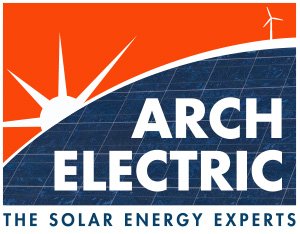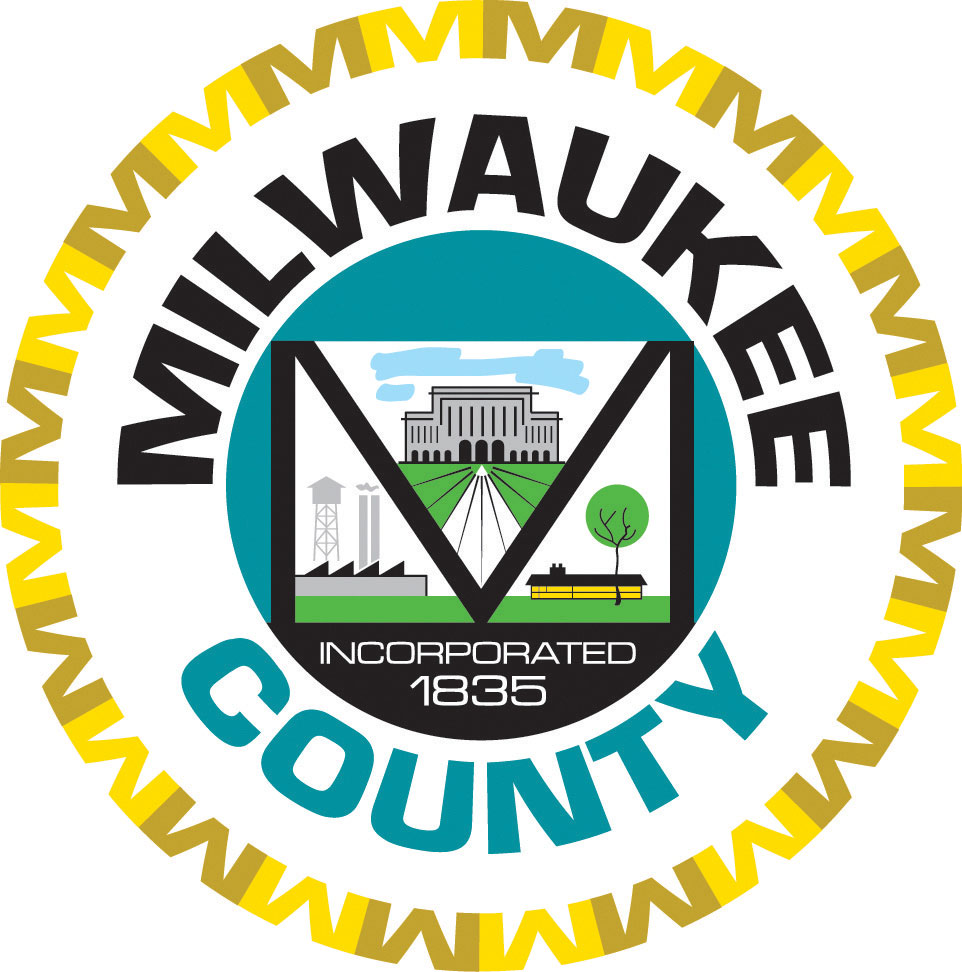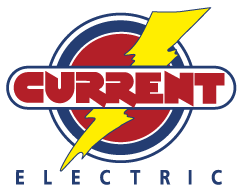
by Tyler Huebner | Oct 2, 2018 | Biogas, Events, RENEW Wisconsin, Solar, Solar for Good, Wind
On Saturday, September 29th, fifty bike riders enjoyed our sixth annual “Ride with RENEW” bicycle tour! This year’s tour was in Milwaukee and we saw solar, wind, and biogas renewable technologies up close.
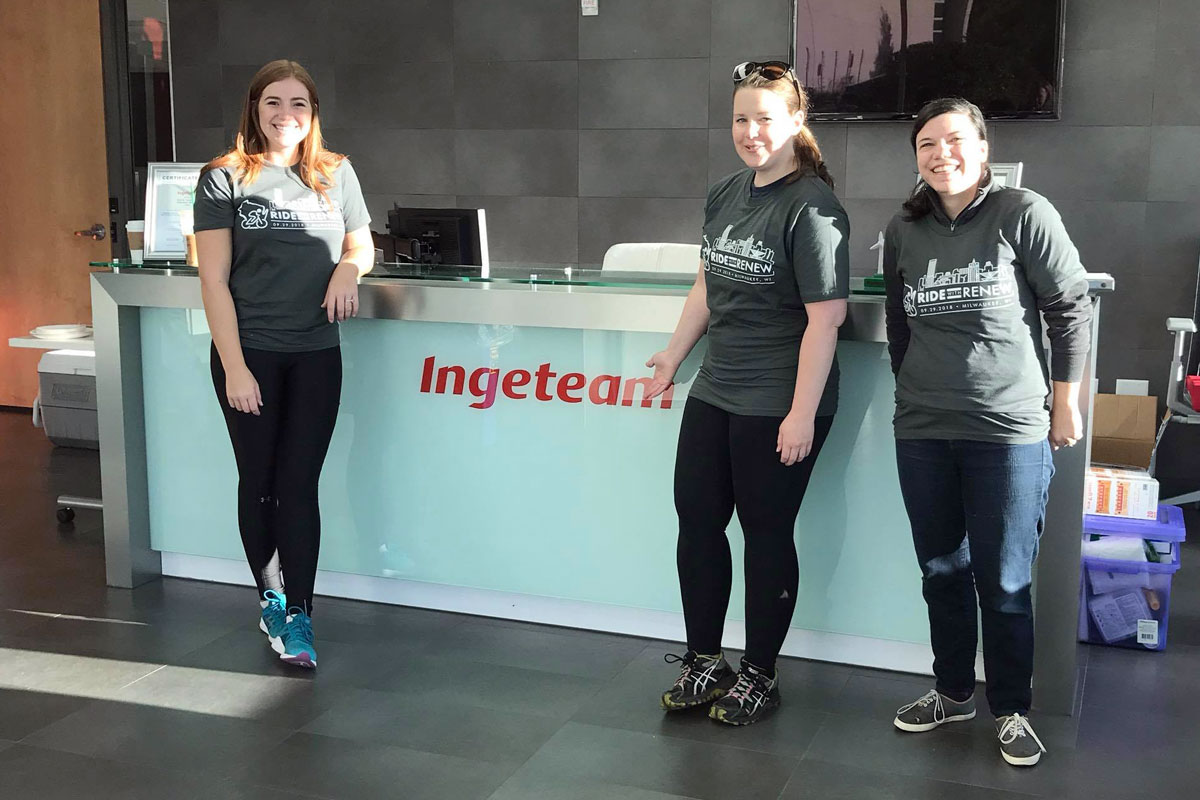 The day started off cool, but as the sun rose the temps came along with it. Ingeteam hosted our morning breakfast and registration, and we learned about their factory and US headquarters which builds wind generators and supports solar and wind projects nationwide.
The day started off cool, but as the sun rose the temps came along with it. Ingeteam hosted our morning breakfast and registration, and we learned about their factory and US headquarters which builds wind generators and supports solar and wind projects nationwide.
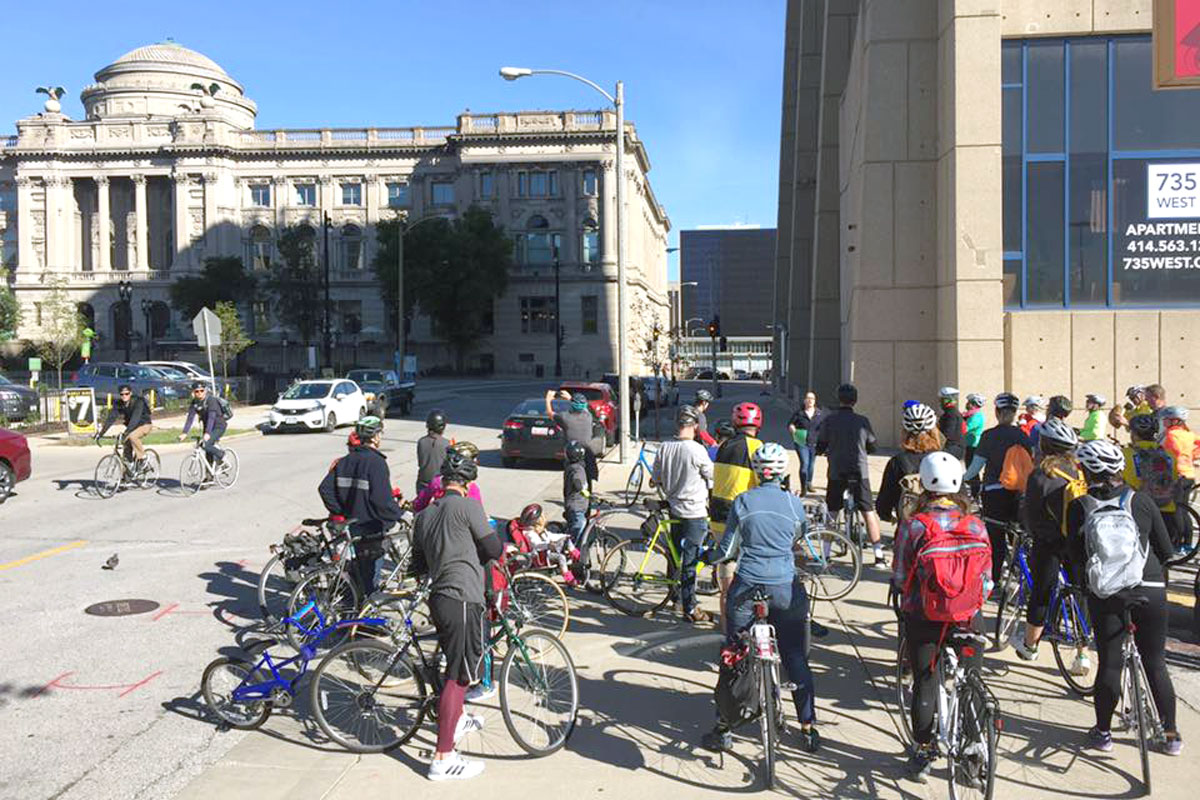 Next we visited the City of Milwaukee’s Public Library, where the City’s Elizabeth Hittman regaled our crowd with the City’s plans to install 1.1 megawatt of solar across six City buildings. The Library will get a 121 kilowatt solar PV system as part of this project.
Next we visited the City of Milwaukee’s Public Library, where the City’s Elizabeth Hittman regaled our crowd with the City’s plans to install 1.1 megawatt of solar across six City buildings. The Library will get a 121 kilowatt solar PV system as part of this project.
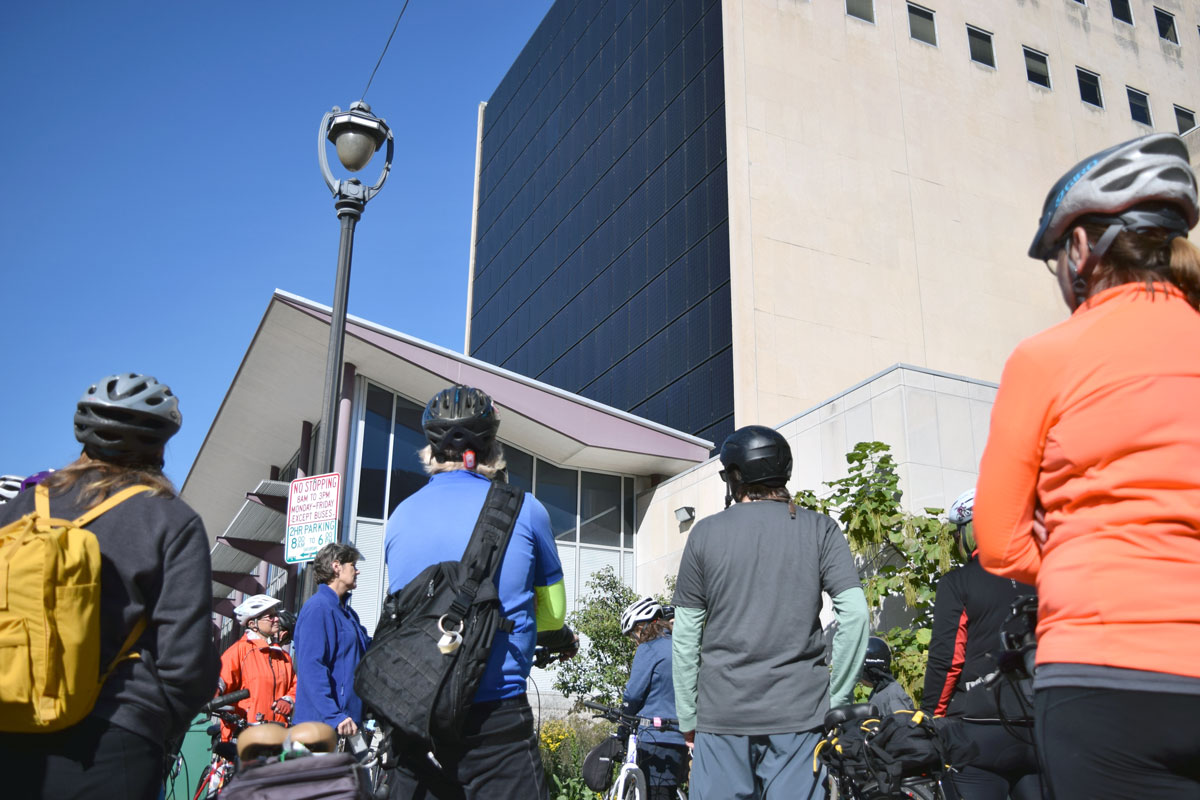 A block away, we visited the largest vertical solar PV wall in the U.S. according to project developer Convergence Energy. The project is at the Milwaukee Public Museum, and Director Ellen Censky motivated our crowd with her story of getting sustainability done!
A block away, we visited the largest vertical solar PV wall in the U.S. according to project developer Convergence Energy. The project is at the Milwaukee Public Museum, and Director Ellen Censky motivated our crowd with her story of getting sustainability done!
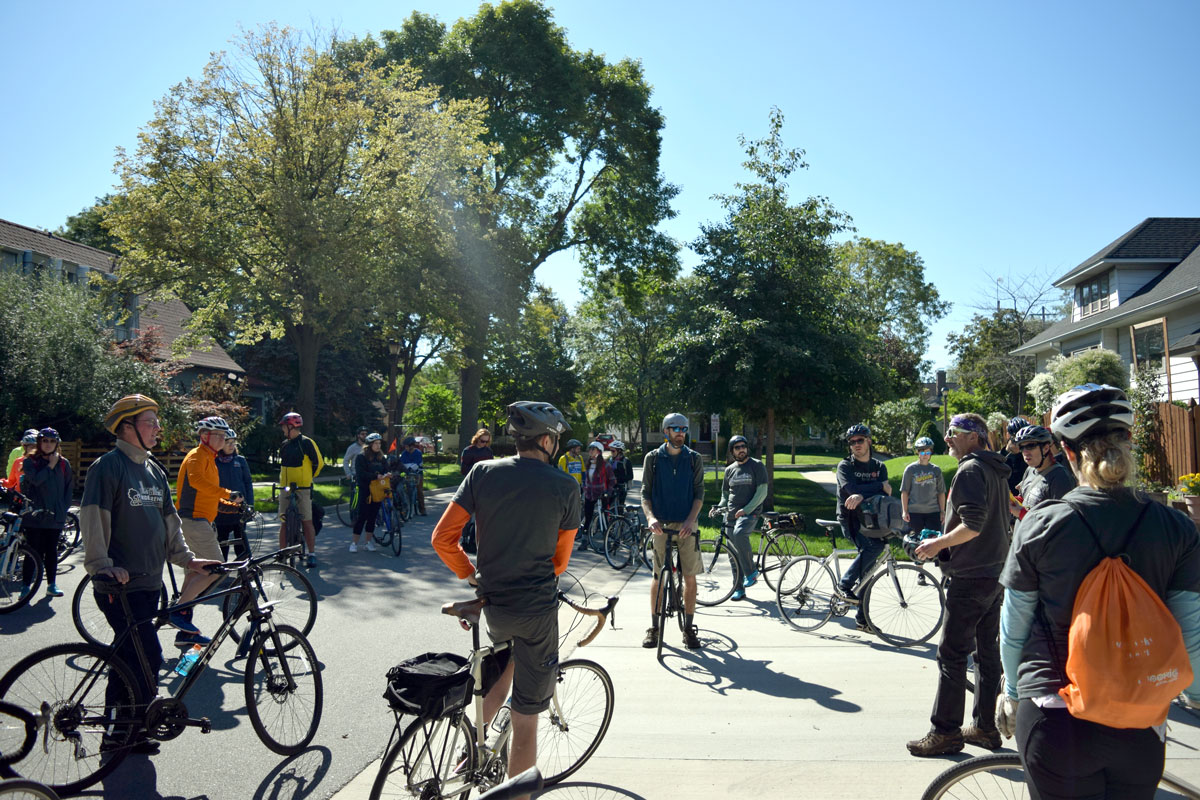 Next, we rode trails north to Shorewood where we saw solar on homes from a recent solar group buy through the City’s Milwaukee Shines Programand the Midwest Renewable Energy Association.
Next, we rode trails north to Shorewood where we saw solar on homes from a recent solar group buy through the City’s Milwaukee Shines Programand the Midwest Renewable Energy Association.
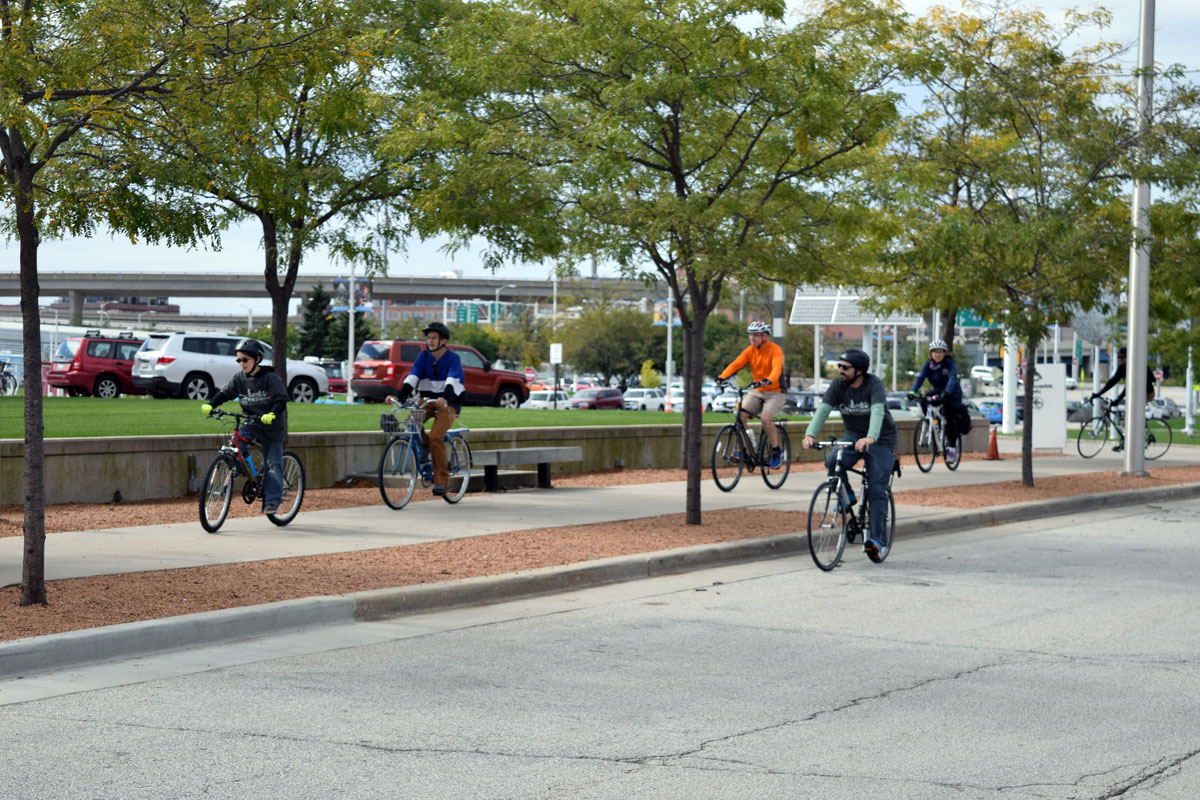 Then we headed to the lake, where we ate lunch at the Discovery World which includes geothermal heating and cooling, which ride sponsor HGA Architects helped integrate into the building.
Then we headed to the lake, where we ate lunch at the Discovery World which includes geothermal heating and cooling, which ride sponsor HGA Architects helped integrate into the building.
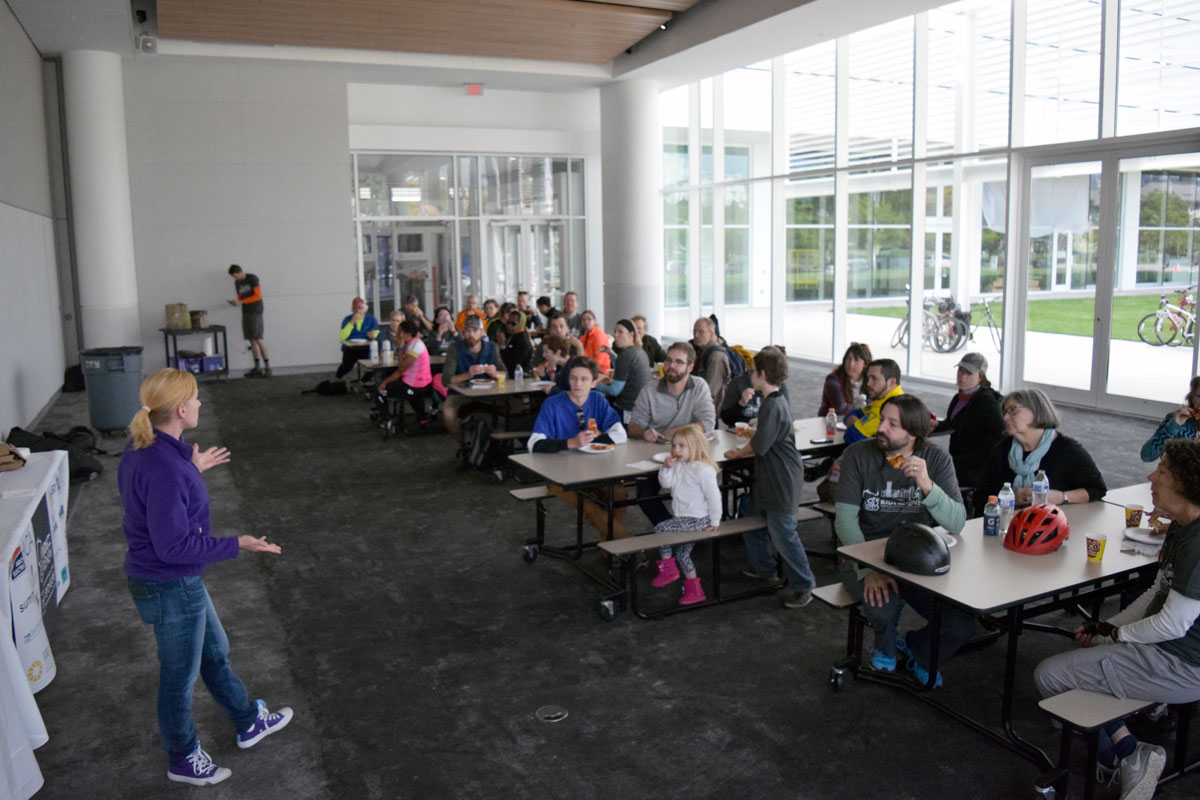 Have you ever had solar-powered pizza delivered by an electric car? We did! Our lunch was delicious and provided by Bounce Milwaukee. Bounce uses solar electricity to power solar ovens that cook pizzas, which are then delivered by electric cars. Ice cream was also provided by Cedar Crest Ice Cream.
Have you ever had solar-powered pizza delivered by an electric car? We did! Our lunch was delicious and provided by Bounce Milwaukee. Bounce uses solar electricity to power solar ovens that cook pizzas, which are then delivered by electric cars. Ice cream was also provided by Cedar Crest Ice Cream.
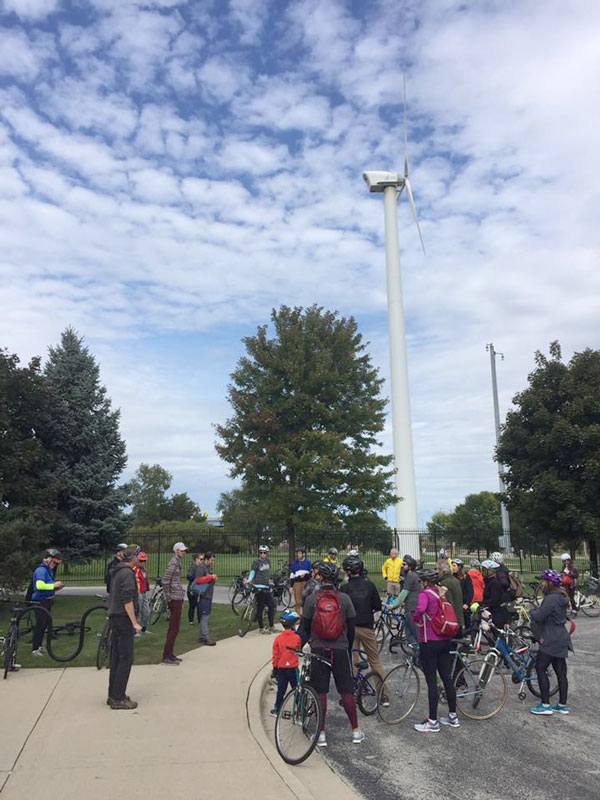 After lunch, we visited the Port of Milwaukee’s wind turbine which is close to producing 1 million kilowatt-hours of electricity and is coming up on six years of operation.
After lunch, we visited the Port of Milwaukee’s wind turbine which is close to producing 1 million kilowatt-hours of electricity and is coming up on six years of operation.
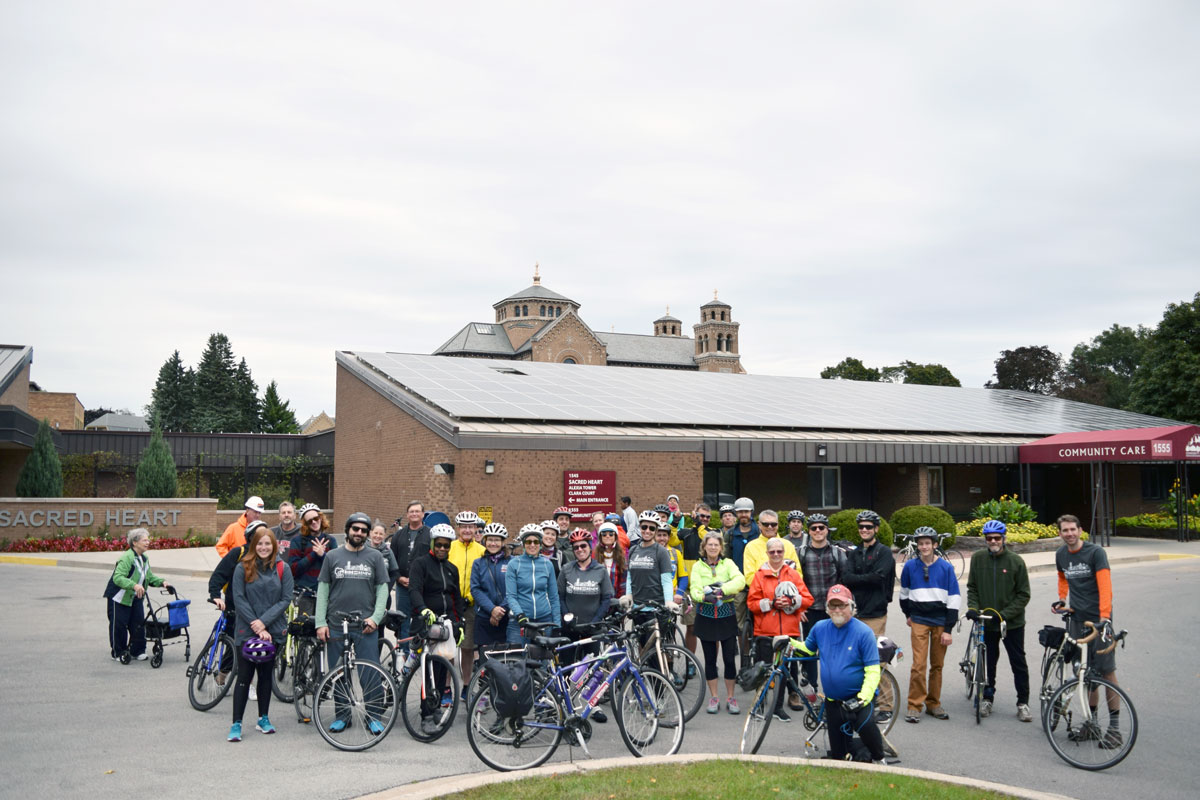 Then, two non-profit organizations showed how broadly solar has grown. Mike Cornell of Arch Electric showed off their project at the School Sisters of St. Francis, which we believe is the largest solar project for a religious order in Wisconsin. The solar panels at this project are made in Jackson, Mississippi, by Seraphim.
Then, two non-profit organizations showed how broadly solar has grown. Mike Cornell of Arch Electric showed off their project at the School Sisters of St. Francis, which we believe is the largest solar project for a religious order in Wisconsin. The solar panels at this project are made in Jackson, Mississippi, by Seraphim.
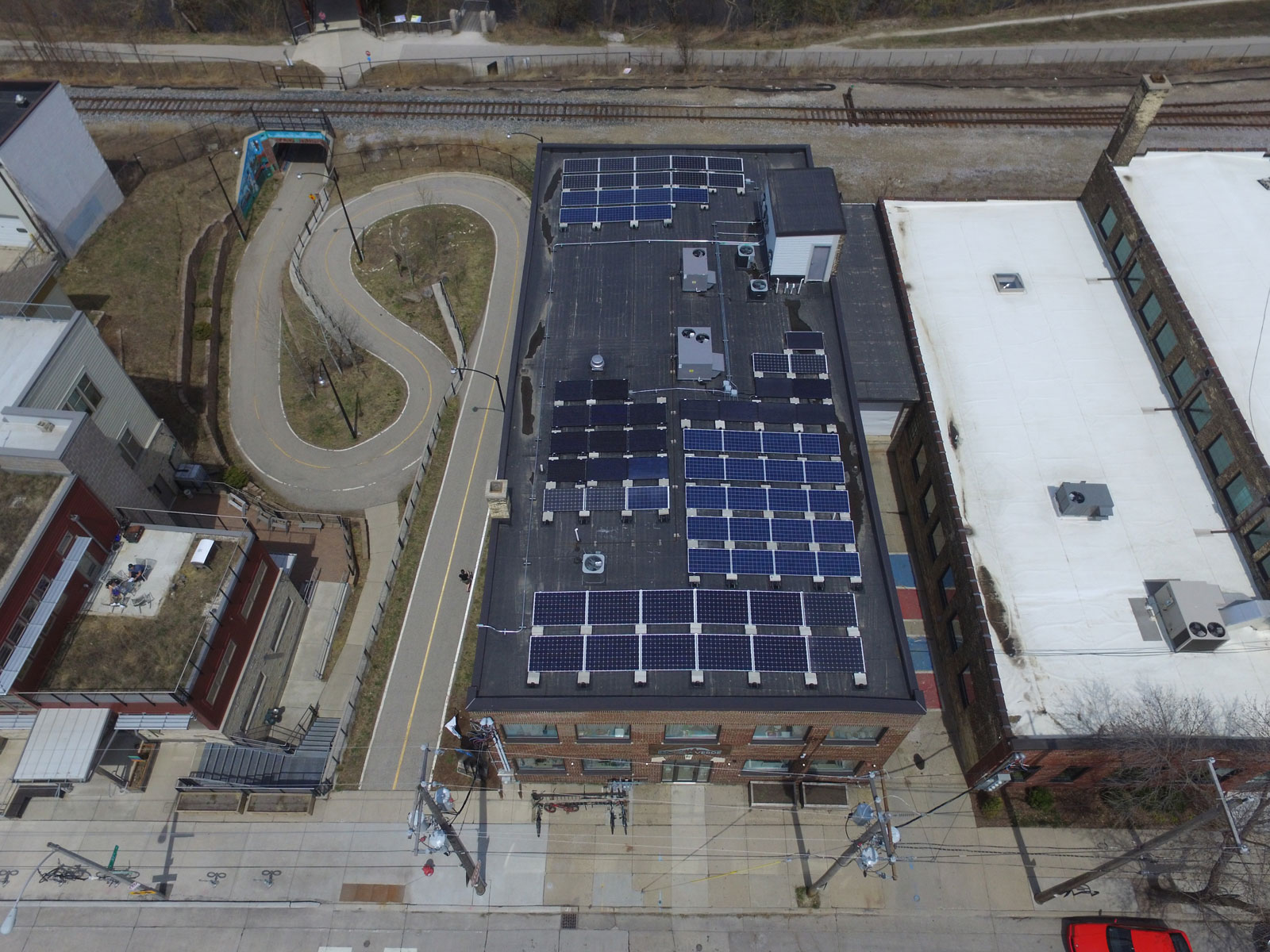 Escuela Verde was our second-to-last stop, where Catie Malcheski of Sunvest described the school’s vision and actions to get solar. The panels had been donated by Helios when it was making panels in Milwaukee a few years ago, but the school needed to raise the money to complete the installation. RENEW’s Solar for Good program was a key contributor to making the project happen!
Escuela Verde was our second-to-last stop, where Catie Malcheski of Sunvest described the school’s vision and actions to get solar. The panels had been donated by Helios when it was making panels in Milwaukee a few years ago, but the school needed to raise the money to complete the installation. RENEW’s Solar for Good program was a key contributor to making the project happen!
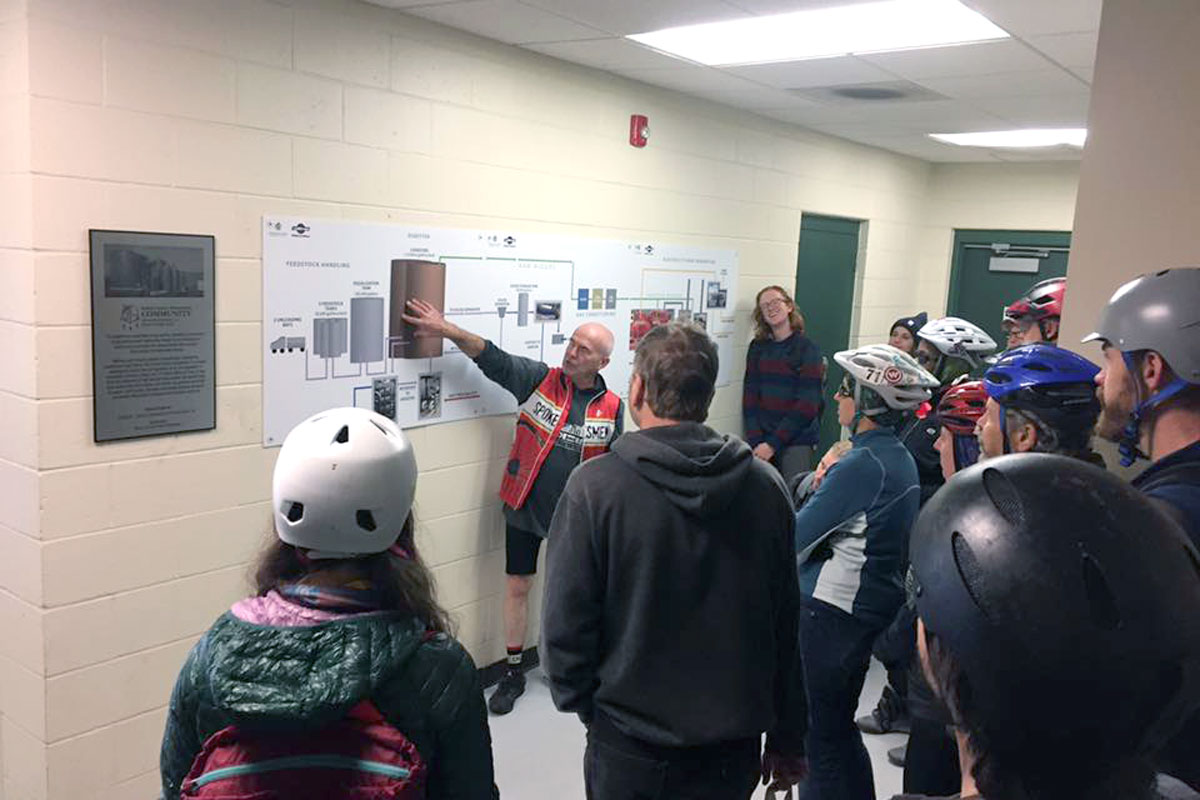 Our last stop was at the Forest County Potawatomi Community’s Biodigester, which is located next to the casino. The Biodigester takes food waste from the casino and other locations and turns it into biogas, which is then used to create electricity. Waste heat is also piped to the casino in the winter. Charlie Opferman of the Potawatomi Community told us how the biodigester is basically a big stomach in action.
Our last stop was at the Forest County Potawatomi Community’s Biodigester, which is located next to the casino. The Biodigester takes food waste from the casino and other locations and turns it into biogas, which is then used to create electricity. Waste heat is also piped to the casino in the winter. Charlie Opferman of the Potawatomi Community told us how the biodigester is basically a big stomach in action.
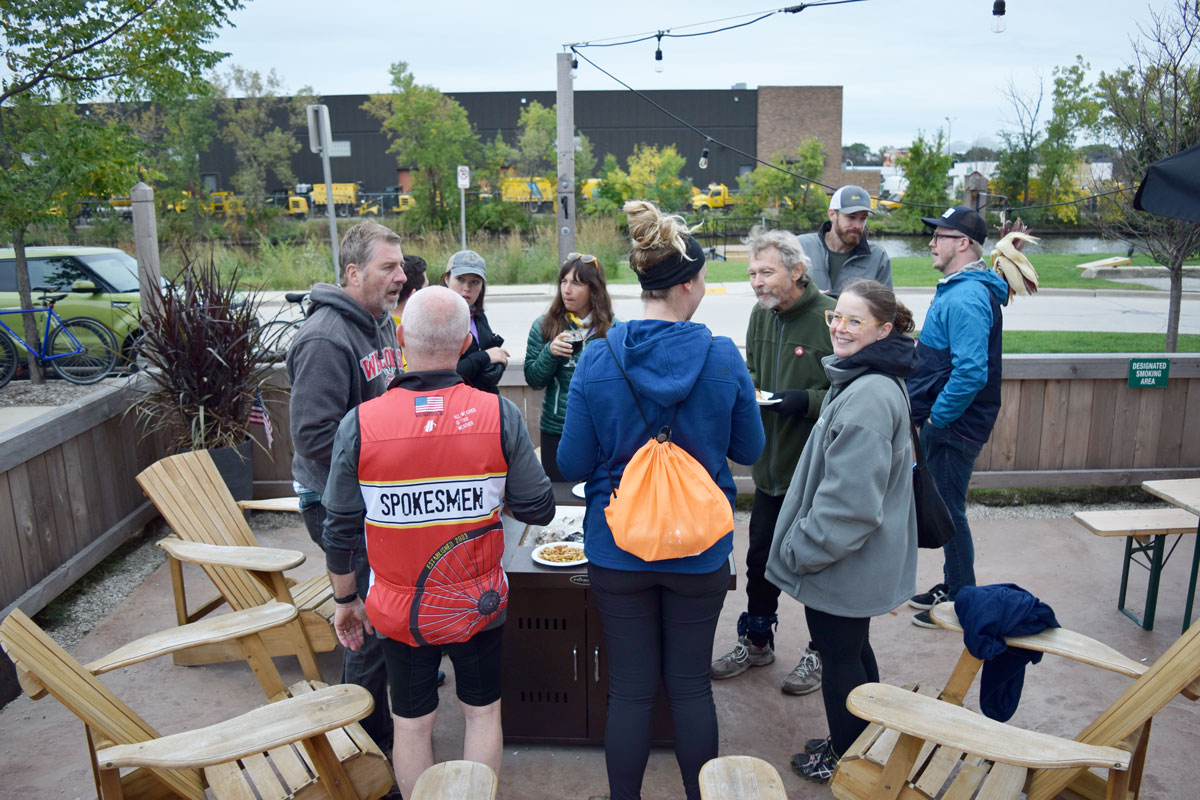 We finished up by having a beer and snacks at City Lights Brewing Company.
We finished up by having a beer and snacks at City Lights Brewing Company.
We also once again enjoyed excellent financial support from our sponsors, RENEW Wisconsin members, and friends and family of our bike riders who donated to support the riders. John & Mary Frantz offered to match up to $15,000 in donations towards our ride, and we exceeded our goal again! All event proceeds will support RENEW Wisconsin’s ongoing work to advance renewable energy in Wisconsin.
Thank you once again to all of our riders, sponsors, and supporters!
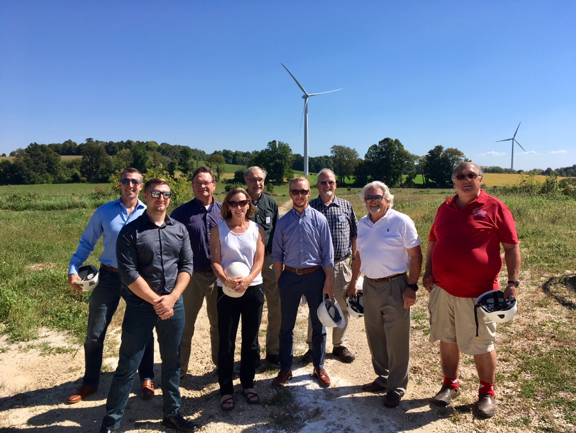
by Jim Boullion | Oct 2, 2018 | Advocacy, Biogas, Electric Vehicles, Events, Jobs, Policy, RENEW Wisconsin, Renewables, Solar, Utilities, Wind
September was a busy month for me and RENEW Wisconsin. I attended more than 30 meetings, seminars and site visits all over the state. Many of them involved learning about Wisconsin’s exciting and fast growing renewable energy industry and building relationships with the talented people who help make it go. There were also numerous meetings with state and local policy makers as well as the leadership of many influential trade associations, unions and advocacy groups. Working together, we are starting to develop ideas for the 2019-20 legislative session that will help advance the use of clean, renewable energy that will create jobs, economic growth and save money for everyone!
Customers First! Power Lunch – Go Electric!
September got off with a “high voltage” start at the Customers First! Coalition Power Lunch, with the theme of “Go Electric”. Over 120 attendees learned about the latest developments and benefits of electric vehicles and “efficient electrification” – replacing direct fossil fuel use with electricity in a way that reduces overall emissions and energy costs. Efficient Electrification holds significant potential benefits for Wisconsin customers, utilities, and environmental advocates alike. PSC Chairman Lon Roberts gave the opening keynote speech and several panels with utility executives and state legislators Mark Spreitzer (D-Beloit) and Mike Kuglitsch (R-New Berlin) dove deeper into the technical and policy issues that will need to be addressed to keep up with these fast-growing trends. The program was interesting enough that WisconsinEye, the not-for-profit State Capitol broadcast network, recorded the event.
Emmi Roth Solar Panels
On September 11th I joined State Representative Travis Tranel at the Emmi Roth Cheese plant in Platteville to cut the ribbon on their new 1,600 panel solar system. The system will provide 15% of their electric use. “There are many companies trying to live up to sustainability goals,” said Jim Pullen, General Manager at Eagle Point Solar, who installed the system. “Emmi Roth is part of a group that actually makes these goals a reality and invests in the environment.” The company also recently invested in a new anaerobic digester at the same location in Platteville, Wisconsin, in an effort to lower operational costs and remain environmentally responsible for the waste being produced during their cheesemaking operations. According to Tim Omer, president and managing director at Emmi Roth, “We have a very strong commitment to sustainability. We want to have the lowest possible carbon footprint we could have in the industry.”
Butler Ridge Wind Farm
On September 17th, Pauline Meyer and Nic Cravillion, policy staff from Congressman Mike Gallagher’s office, and Dodge County Board member Russ Kattke joined me at a tour of the Butler Ridge Wind Energy Center in Dodge County. This was a behind the scenes tour of one of Wisconsin’s premier wind farms and was hosted by NextEra Energy Resources. Butler Ridge’s 36 turbines generate 54-megawatts of clean, renewable energy to power more than 13,500 homes. Wisconsin based Faith Technologies, who installed the ground grid and in-tower wiring, and The Boldt Construction Company were two of the prime contractors on the project.
Conservative Energy Forum Summit on “Advancing Wisconsin’s Clean Energy Economy” and Clean Energy Week Proclamation by Governor Walker
On Thursday, September 27th the Wisconsin Conservative Energy Forum hosted a summit onclean energy developments in Wisconsin. PSC Commissioner Lon Roberts opened the meeting discussing the bright future of renewable energy. Several guest panels discussed Utility Scale Clean Energy – A Turning Point for Wisconsin Utilities, and Decentralizing Energy & Encouraging Private Sector Investment. Lt. Governor Rebecca Kleefisch also spoke about the great things happening for clean energy in Wisconsin and how renewable energy fits so well into a conservative political viewpoint. At the end of her talk, Kleefisch presented a proclamation from Governor Scott Walker designating September 24th to September 28th as Clean Energy Week in Wisconsin. This echoed the clean energy week activities around the country.
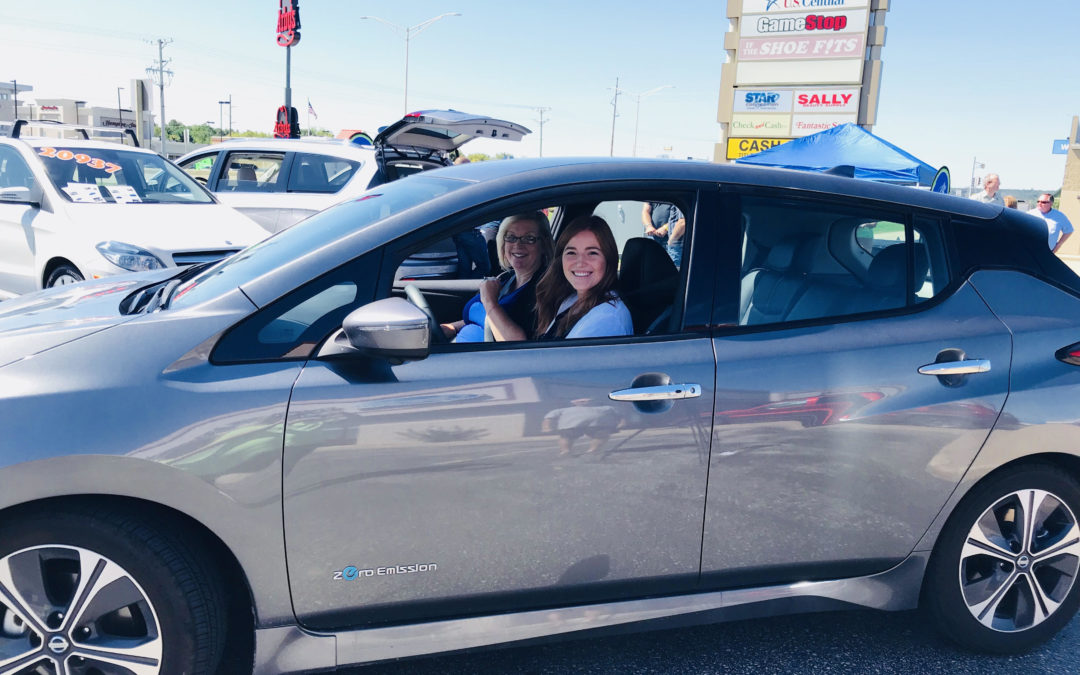
by Jane McCurry | Oct 1, 2018 | Electric Vehicles
Hello! My name is Jane McCurry and I started working as a Program Manager at RENEW Wisconsin in July of 2018. My work involves researching the electric vehicle (EV) market and trying to figure out what RENEW Wisconsin can do to accelerate EV adoption.
My Story
I grew up in Metro-Detroit and both of my parents worked for Ford Motor Company. My connection to the automotive industry is made nearer and dearer by my family’s ties to Henry Ford. Henry Ford’s mother, Mary Litogot Ford, is an aunt on my maternal direct lineage (my mom’s maiden name is Litogot). Growing up, I loved learning about Henry Ford and the rise of automobiles and it seems natural that my role with RENEW has started with studying the transportation sector.
I’ve spent my first two months deeply researching electric vehicles, charging stations, learning what other states and advocacy groups are doing, and investigating the Volkswagen diesel emissions settlement, which provides funding to every state to advance cleaner vehicles.
Before my job at RENEW, I had never driven an EV and didn’t know much about them. After getting behind the wheel of the Tesla Model 3, Chevy Bolt, Chevy Volt, Ford Fusion Energi, and the Nissan Leaf, I can say that all of them are quiet and much more fun to drive than my current car. I am fond of my red Ford Escape, but it will definitely be my last gasoline vehicle.

Electric Vehicles Match RENEW’s Mission
Not only are EVs fun to drive, but they represent a huge opportunity to decrease fossil fuel use and increase renewable energy production in Wisconsin. If cars run on electricity instead of petroleum, we can drive on energy produced in Wisconsin from renewables. That means no tailpipe emissions and cleaner air for everyone.
The market for electric vehicles is just starting to develop. If more consumers (like you and me!) are educated about the benefits of driving electric, there won’t be any doubt that EVs are the best option. I’m confident many of the short-term barriers to adoption will go away as demand for EVs increases. With proper consumer awareness, EV adoption has the potential to skyrocket.
I’m excited for a future where we all drive on renewable energy. Stay tuned for more information about transportation electrification, what RENEW is doing to support adoption, and opportunities to fuel our vehicles with clean, renewable energy.

by Heather Allen | Oct 1, 2018 | Solar, Solar for Good
More Solar Energy for Wisconsin Nonprofits
RENEW Wisconsin’s Solar for Good program today opened its third application process with approximately $100,000 in grants available for mission-driven nonprofit organizations across Wisconsin seeking to install solar power.
The grants assist nonprofits in funding the cost of a clean, renewable solar power project. Smaller grants can also provide technical assistance, including professional solar site assessments and engineering services, needed to get solar projects off the ground.
Solar power is very popular with mission-driven nonprofits because it aligns with their goals to improve people’s well-being and create a better future. The projects also help nonprofits save money on energy costs.
Through the first two rounds of this Solar for Good, successful solar projects have been supported for organizations of faith, those serving human needs, groups protecting special places, and more. The first two rounds occurred in Fall 2017 and Spring 2018, and so far, 25 solar projects have been awarded grants, and 12 projects are already completed.
“We are very pleased to announce our third round of Solar for Good funding to help more Wisconsin nonprofits take advantage of solar energy. Solar energy is healthy energy for people and for the beautiful Wisconsin landscapes we all enjoy,” said Tyler Huebner, Executive Director of RENEW Wisconsin.
Solar for Good is funded through generous donations from local philanthropists Cal and Laurie Couillard of Deerfield and additional donors. The program provides up to 20% of the cost of a solar array, with a grant cap of $10,000 for solar arrays sized less than 75 kilowatts and a grant cap of $20,000 for arrays 75 kilowatts and above. Solar for Good has already awarded over $200,000 in grants, resulting in nearly $1.8 million of new solar power projects in Wisconsin.
In return for funding assistance, recipients of the Solar for Good grants help spread the word about their project and educate their communities about solar power’s benefits.
How to Apply
Organizations can learn more and apply at https://www.renewwisconsin.org/solarforgood/.
In order to be eligible, the organization must be a registered nonprofit organization located in Wisconsin, be in good financial standing, be ready to install solar and agree to participate in educating community members about the benefits of solar energy. If approved for a grant, all fundraising, design and installation for the solar project must be completed within 12 months.
Applications are open now for this round of funding and must be received by Tuesday, November 13th 2018 at 5:00pm. Decisions and funding announcements will be made by Monday, November 26th, 2018.
For organizations looking at solar for the first time, technical assistance grants are available to fund a solar site assessment (up to $250) or engineering review (up to $500) for their solar array. These applications will be reviewed separately from the applications for grants for solar installation and will be awarded on a first-come, first-served basis.
About RENEW Wisconsin
RENEW Wisconsin is a nonprofit organization which promotes renewable energy in Wisconsin. We work on policies and programs that support solar power, wind power, biogas, local hydropower, and geothermal energy. More information is available on RENEW’s website: www.renewwisconsin.org.
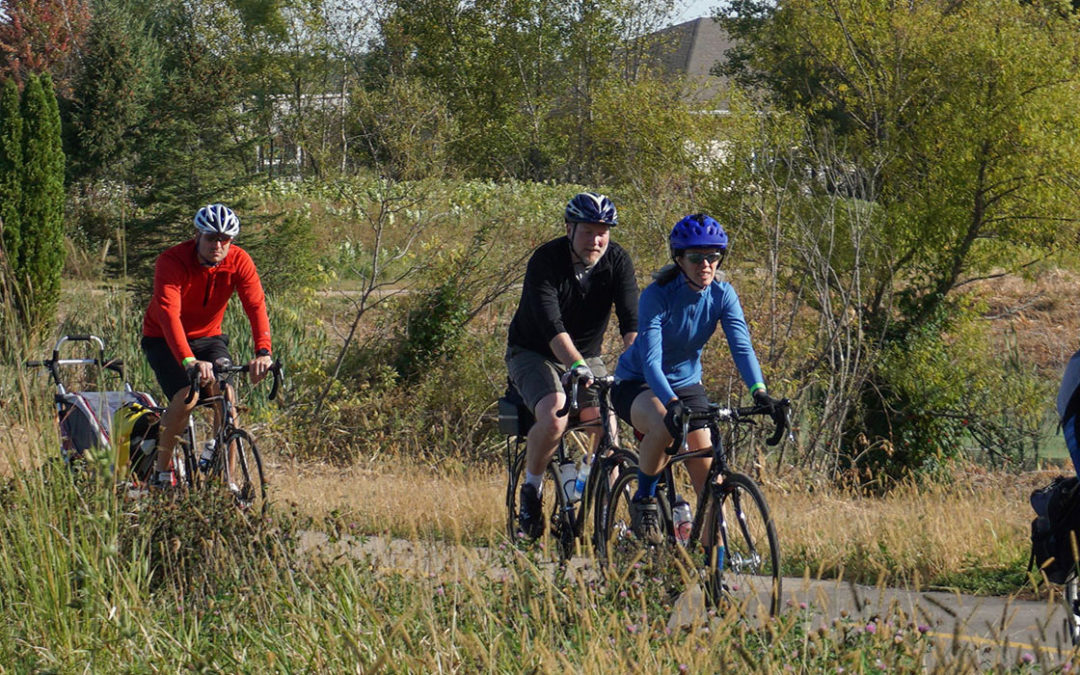
by Jodi Jean Amble | Sep 17, 2018 | Biogas, Events, Geothermal, RENEW Wisconsin, Renewables, Solar, Wind
September 29 event to highlight area renewable energy projects.
Madison, WI – On Saturday, September 29th, RENEW Wisconsin will host its 6th annual “Ride with RENEW” bicycle tour of renewable energy projects, with this year’s ride taking place in Milwaukee, WI. All event proceeds support RENEW Wisconsin’s ongoing work to advance renewable energy in Wisconsin.
Riders will travel approximately 25 miles on paved roads and bike paths to visit innovative wind, solar, geothermal, and biogas energy generation facilities in Milwaukee.
The total tour time will be approximately 6 hours (including stops at renewable energy sites) and actual riding time will be 2 to 3 hours.
Participants will get an inside look at some of the area’s leading renewable energy projects and will enjoy breakfast, lunch, and beverages along the way. They will visit with installers and workers who are advancing renewable energy every day, and hear from customers about why clean energy works for their pocketbooks and their businesses.
The day’s tour will include:
- Gather at Ingeteam parking Lot a 9:00 a.m. departure. – Ingeteam has a LEED Gold, 138,000 square foot industrial facility and is a leading manufacturer of wind and solar energy products.
- Milwaukee Public Museum – MPM features 234 solar panels on its south-facing tower wall. The panels are linked to a kiosk located on the ground floor that provides near-real-time data on the energy generated by the panels.
- Discovery World Science and Technology Center – Discovery World at Pier Wisconsin is a youth-oriented science and technology museum and aquarium in downtown Milwaukee and features geothermal heating and cooling.
- Port of Milwaukee Wind Turbine – The City of Milwaukee’s Environmental Collaboration Office (ECO) and the Port of Milwaukee partnered to install a 100 kilowatt wind turbine at the Port. Installed by Kettle View Renewable Energy, the turbine provides more than 100 percent of the electricity needed by the Port administration building.
- Escuela Verde – This public charter school, designed to support students interested in sustainability, student-led learning, and restorative justice, was a recipient of a 2017 Solar for Good grant. In 2018, 60 solar panels were installed by SunVest and Current Electric on the roof of the school.
- School Sisters of Saint Francis – The Milwaukee branch of the School Sisters of Saint Francis partnered with Arch Electric to install 1,086 solar panels on the rooftop of the St. Francis Sacred Heart building in 2017. Producing 375 kilowatts of solar, the solar array is able to help offset more than 12 percent of the electricity consumed at the Sacred Heart facility.
- Potawatomi Biodigester – This waste-to-energy project converts waste materials generated by the food and beverage industries to electricity. The electricity produced is sold to WE Energies as renewable energy.
- The ride will conclude at City Lights Brewery for refreshments at around 4:00 p.m.
Registration for the ride is open through September 28th. The cost is $40 for members of RENEW Wisconsin, $50 for non-members, and $70 to both register for the ride and become a member of the organization for one year. All donations to RENEW Wisconsin for this charity bike ride are matched up to $15,000 by generous donors John & Mary Frantz of Madison!
Individuals and businesses can donate to RENEW Wisconsin or in support of a rider, sign on as an event sponsor, or volunteer on ride day.
“We are very excited to tour some of Milwaukee’s best renewable energy projects on Saturday, September 29th,” said Tyler Huebner, Executive Director of RENEW Wisconsin. “This tour allows us to showcase a variety of ways to produce homegrown, clean energy right here in Wisconsin including wind, solar, and even food waste. This is a really fun event where you can meet great people, help a good cause, and learn together about clean energy in Wisconsin.”
Sponsors of the Event include Arch Electric, HGA, SunVest, Bounce Milwaukee, Discovery World, Milwaukee County, Summit Credit Union, SunPeak, UW Engineering Professional Development, Current Electric, H&H, Milwaukee Shines, Wegner CPAs, and Open Circle Unitarian Church – Fond du Lac.
There is still time to sponsor if your business or organization wishes to do so.
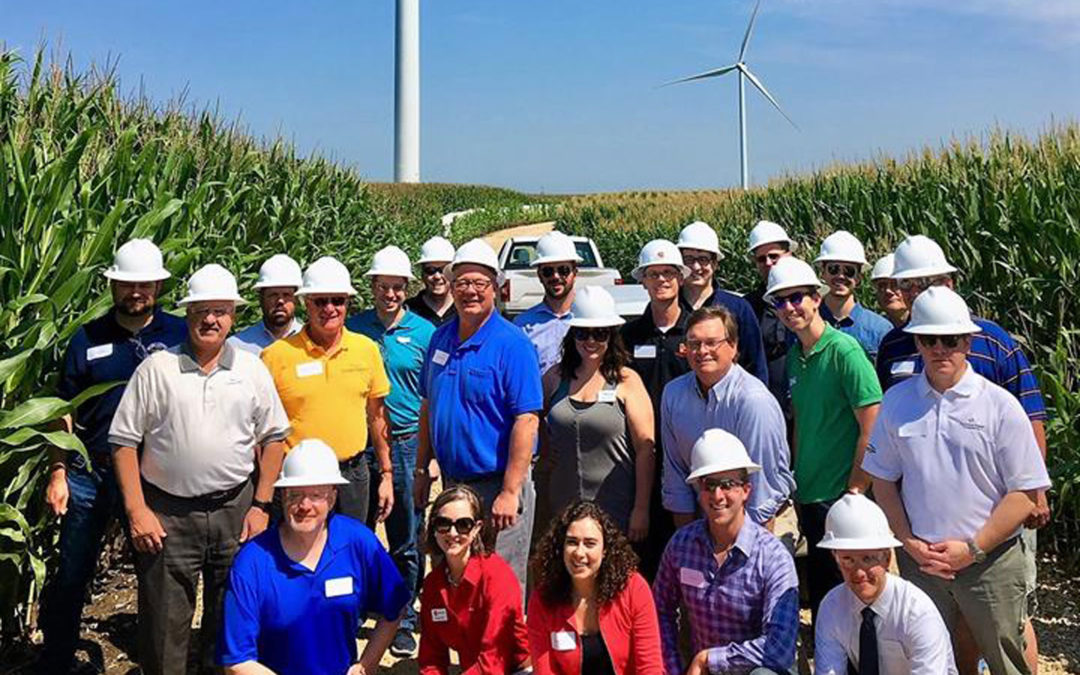
by Jim Boullion | Sep 4, 2018 | Biogas, Events, RENEW Wisconsin, Renewables, Solar, Utilities, Wind
Quilt Block Wind Farm
On August 9th, Vanessa Tutos, Director of Government Affairs for EDP Renewables hosted me and a large group of legislators, legislative staff and other interested people on a tour of their Quilt Block Wind Farm near Darlington, Wisconsin.
During a pre-tour briefing, Vanessa and the EDP Renewable staff gave an overview of the facility and how it works. Darlington Mayor Dave Breunig also participated in the briefing, explaining the many benefits that the Quilt Block facility brings to the local communities, including not only the town and county tax revenues, but the good paying jobs at Quilt Block and the many community businesses that benefit such as restaurants, hotels and other shops.
In attendance were State Senator Howard Marklein and Rep. Todd Novak. Legislative staff: Garrett Huffman, Rep. Kuglitsch (Assembly Utilities Committee Chair); Kyle Koenen and JJ Sherman, Sen. Kapenga staff; Brian Radday, Sen. LeMahieu staff (Senate Utilities Committee Chair); Evan Miller, Sen. Cowles staff (Senate Energy Committee Chair); Dave Breunig, Mayor of Darlington; Alex Ignatowski, Wis. Public Service Commission; Ryan Owens, Tommy Thompson Center on Public Leadership – UW Madison; Jon Hochkammer, Wisconsin Counties Association; Rob Richard, Wisconsin Farm Bureau; Tim Hoven, EDPR
School Sisters of St. Francis
On Tuesday, August 22nd, the Wisconsin Association of Energy Engineers invited me and Jane McCurry of the RENEW Wisconsin staff to tour something old and something new, all in one location, the School Sisters of St. Francis campus in Milwaukee. The Sisters recently installed a 375-kW solar array with 1,086 panels on several of their buildings.
Sister Carol Rigali, Coordinator of the province leadership team, specifically asked that the panels be made in the USA. As Mike Cornell of Arch Electric explained, they acquired the panels from Seraphim Solar USA, from Jackson, Mississippi. Sister Carol said that St. Francis expects to save $1.5 million in energy costs over the life of the system, but that was only one reason they did the project.
She noted that in his 2015 encyclical Laudato Si, Pope Francis specifically mentioned installing solar panels as one way to care for creation. “This solar energy project will enable us to lessen our energy consumption and to invest in our care of the earth.” The chapel was finished in 1914 but looks as amazing as the day it was built. The art and architecture inside compare to some of the best churches anywhere in the world. Now they have a state-of-the-art solar generation system that will help them achieve their mission now and into the future. Preserving the past by embracing the future! Nicely done Sisters!
Wisconsin Agriculture Coalition
On Monday, August 27, I was joined by RENEW Wisconsin’s Executive Director Tyler Huebner, Scott Smith from Madison Gas & Electric and Neil Palmer from Invenergy to give a briefing to the Wisconsin Agriculture Coalition about the latest developments in renewable energy and how it may affect their members. The Agriculture Coalition is a group of association executives and government affairs staff who meet regularly to discuss legislative and regulatory issues in which they have a common interest.
I opened the meeting by discussing the changing economics and politics of renewable energy and let them know that they are going to be seeing a lot of activity in Wisconsin. Tyler then gave an overview of renewables in Wisconsin that will especially impact farms and agriculture related businesses such as solar and wind farms and biogas generation. Scott gave the utility perspective on why they are all adding large scale renewables to their portfolio and the benefits that they see for their customers. In particular, he noted that the driving force was the impressive price drop of over 75% for solar power in the last 10 years.
Finally, Neil spent some time explaining how Invenergy goes about developing a utility scale solar project, from identifying good locations with access to substations and landowners with enough flat, open land who are interested in leasing their property, to the steps and timing of the regulatory process. We also had a good discussion about the “frequently asked questions” that they may be hearing from their members and how to answer them. In summary, everyone in attendance received a good, general understanding of the amazing changes that are happening in the renewable industry and that RENEW Wisconsin is their source for reliable, fact-based information!
Members of the Ag Coalition include:
- Wisconsin Farm Bureau Federation
- Wisconsin Farmers Union
- Dairy Business Association
- Wisconsin Cheese Makers Association
- Midwest Food Products Association
- Wisconsin Agri-Business Association
- Wisconsin Association of Professional Agricultural Consultants
- Wisconsin Cattlemen Association
- Wisconsin Pork Association
- Wisconsin Soybean Association
- Wisconsin Potato and Vegetable Growers Association
- Wisconsin Corn Growers Association
- The Cooperative Network Associations
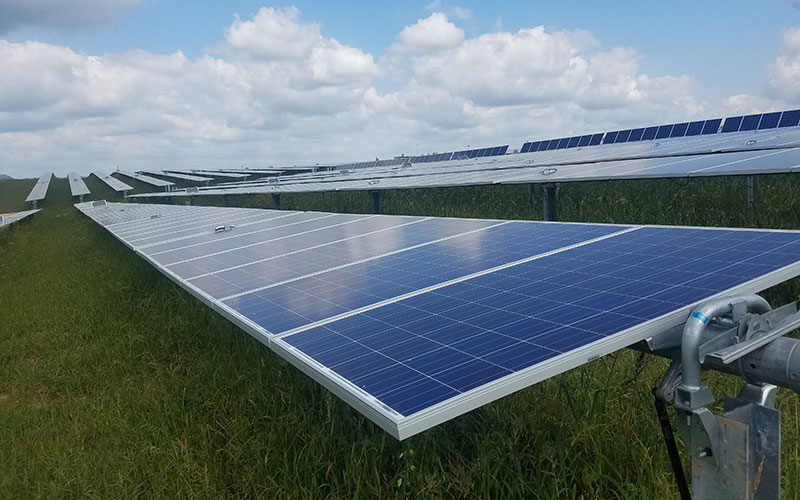
by Michael Vickerman | Aug 22, 2018 | Local Initiatives, RECs, Renewables, Solar
A recently signed contract between the City of Madison and OneEnergy Renewables, LLC, a solar developer headquartered in Seattle, will result in the construction of five community solar arrays totaling 14 megawatts (MW) next year in western Wisconsin. The City’s decision to provide financing to this project represents the largest commitment to date by a single Wisconsin customer to expanding solar capacity here.
Expected to begin operating in mid-2020, OneEnergy’s five arrays should produce about 20 million kilowatt-hours of clean electricity a year over its operating life. That output equates to more than one third of the City of Madison’s own consumption.
OneEnergy’s solar arrays will be built in the service territories of the municipal utilities serving Argyle, Cumberland, Elroy, Fennimore, and New Lisbon. These five utilities will receive the electricity at a price comparable to what they currently pay for wholesale power. However, under the city’s contract with OneEnergy, Madison will receive 25 years of renewable energy credits, or RECs, associated with the project’s output.
The $1.4 million contract will move Madison substantially closer to its goal of sourcing 100% of the electricity used for city operations from renewable energy sources. Madison is one of three Wisconsin municipalities that adopted a 100% renewable energy goal. The others are Eau Claire and Middleton.
Approved by Madison’s Common Council in July, the city’s REC purchase is an essential element in the overall financing for OneEnergy’s solar project. Though the power from the arrays will flow to five different municipal utilities, the agreed-upon purchase price will not, by itself, pay for the project’s full cost. But with the additional revenue stream coming from the City’s REC purchase, the developer should have no difficulty in securing outside investors to participate in the project.
“Through this creative arrangement, new community solar projects totaling 14 MW will move from the drawing boards out into the western Wisconsin landscape,” said RENEW policy director Michael Vickerman. “At a remarkably low cost, the City will expand solar generating capacity in Wisconsin by 15%, and these new sources of zero-carbon power will provide tangible benefits to the City, the rural communities hosting these arrays, and our planet.”
Madison’s action is the second major REC purchase by a Wisconsin customer to support the construction of community-scale solar projects. Last November, LaFarge-based Organic Valley Cooperative, the nation’s largest cooperative of organic farmers, entered into a similar arrangement with OneEnergy to purchase RECs from 12 MW of solar capacity serving another group of small municipal electric utilities. Through that transaction Organic Valley expects to reach its goal of being 100% renewably powered by 2020.
Constructing both sets of arrays will involve only one mobilization of construction equipment and crews. According to OneEnergy, combining the Organic Valley and City of Madison projects into one coordinated build-out will reduce construction costs, which helped make project participation more affordable for both the utility off-takers and the REC purchasers.
OneEnergy is also developing a 4 MW project next to Middleton’s airport with the aim of supplying the City of Middleton and a Madison-area business with solar electricity.
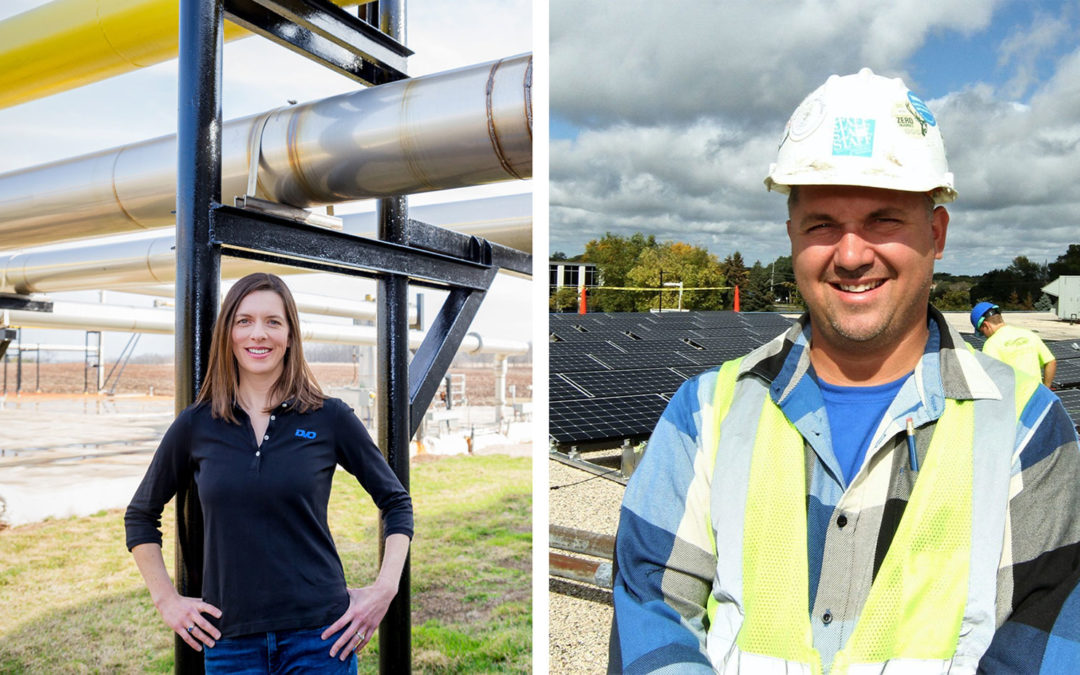
by Jodi Jean Amble | Aug 8, 2018 | Biogas, Jobs, Renewables, Solar, Sustainability, Wind
More than 75,000 Wisconsin residents now work in clean energy industries, including individuals in all 72 counties, according to a new analysis of energy jobs data from Clean Energy Trust (CET) and the national, nonpartisan business group E2 (Environmental Entrepreneurs). Wisconsin’s clean energy workforce employs more than all the waiters and waitresses, computer programmers, lawyers and web developers in Wisconsin combined, according to Department of Labor Employment Statistics.
Energy efficiency once again led all clean energy sectors in Wisconsin, employing 62,299 workers – accounting for 8 in ten of all clean energy workers.
Renewable energy generation came in second with over 5,600 jobs – led by solar and wind (5,351).
“Wind, solar, and energy efficiency are the lowest-cost options for utility companies and our state’s homes, businesses, and public-serving organizations. Wisconsin has a tremendous job creation opportunity because these clean energy technologies are now cost-effective and ready for prime-time,” said Tyler Huebner, Executive Director of RENEW Wisconsin.
Across the entire 12-state region, Clean Jobs Midwest found that clean energy employment totaled 714,255 at the end of last year.
Key findings about Wisconsin’s clean energy workforce include:
• Renewable energy, led by wind and solar, employs 5,660 Wisconsin residents
• Over 2,500 Wisconsin residents now work in grid modernization and energy storage
• The majority of Wisconsin’s clean energy jobs are in construction and manufacturing (75.30%)
• Clean fuels and clean vehicle technologies employ 4,565 workers
• Employers project 2.0% clean energy job growth in 2018
• Small businesses are driving Wisconsin’s clean energy sectors, with 67.90% of clean energy businesses employing fewer than 20 individuals.
• 11% of Wisconsin residents employed in clean energy are veterans
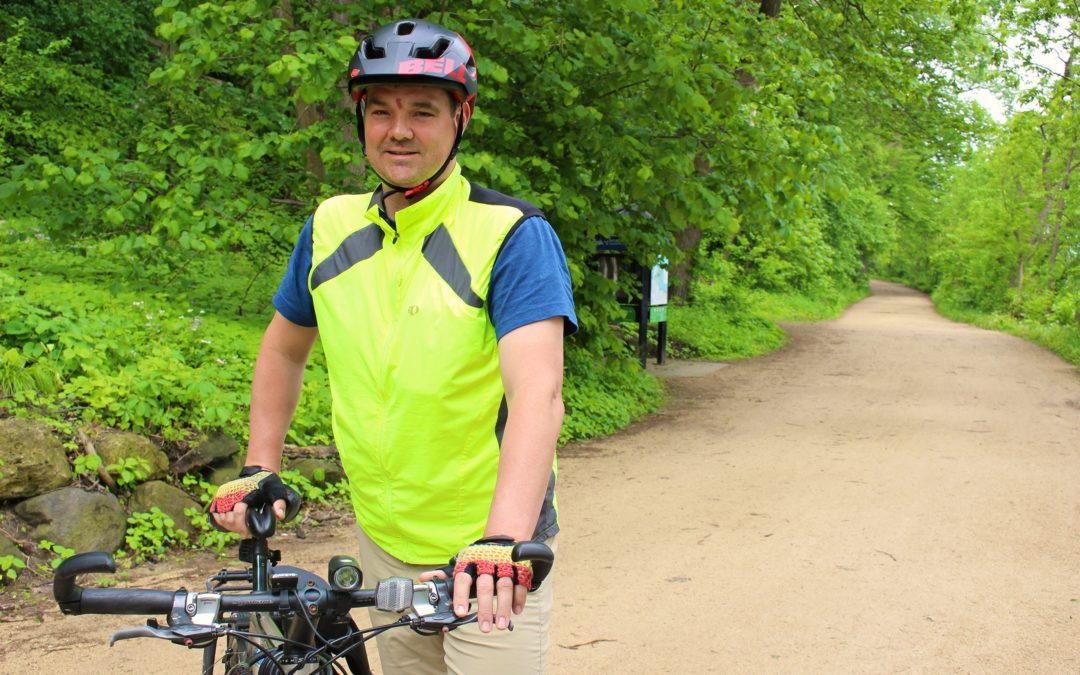
by Jodi Jean Amble | Aug 3, 2018 | Solar
MADISON, Wis. – A University of Wisconsin-Madison professor is biking 2,000 km around the Upper Midwest beginning on July 28th to increase awareness of solar energy and raise funds for a solar energy project in Puerto Rico.
The bike journey, known as #BiketheSun, will take James Tinjum, Ph.D., of UW’s Department of Engineering Professional Development to 50 solar energy sites across Wisconsin, Illinois, Iowa and Minnesota. Riding an electric bike prototype with a plan to bike 160 km per day, the trip will take Tinjum about two weeks to complete.
“Solar is an energy solution that provides clean, renewable, domestic energy across the U.S.,” said Tinjum. “In the last year, if you include rooftop solar, about 2.5 percent of our nation’s electrical supply came from solar. Although this energy source is growing, there is still a lot of room for expansion.”
Along with bringing attention to solar energy, the purpose of #BiketheSun is to raise funds for Solar Para Niños, a solar installation project at a non-profit shelter in Puerto Rico for abused children. The panels will reduce the shelter’s energy costs by as much as $1,000 per month, allowing the shelter to invest more money into educational and counseling services the children. The project will help provide long-term, sustainable relief after Hurricane Maria devastated the island last September.
“Puerto Rico’s power grid was completely knocked out during the hurricane and electricity was not restored across the island for as long as nine months after. Renewable, distributed energy sources like solar will provide more resilient and reliable power, particularly for when another natural disaster occurs,” Tinjum said.
Puerto Rico has the highest electricity rates in the U.S., according to Tinjum. Even though the island has excellent solar resources, it produces over 95 percent of its electrical energy by burning imported natural gas, coal and oil – which are not only expensive, but environmentally unsustainable.
“With the installation and promotion of more renewable sources such as solar energy, institutions like the children’s shelter will substantially reduce their monthly energy bill, as well as move toward a more sustainable use of energy,” he said.
Last summer, Tinjum embarked on a 2,000-km bike ride called #BiketheWind to raise awareness about wind energy, so he’s familiar with long trips triggered by good causes. To prepare for this year’s ride, Tinjum is biking upwards of 24 hours a week, getting in hours by biking to “everything,” including work, groceries and intramural soccer matches.
Tinjum departs for his journey on Saturday, July 28 from Madison, Wisconsin.
To keep up with his journey, visit solarparaninos.com/bikethesun and follow #BiketheSun on social media. Visit solarparaninos.com/donate to donate to the Solar Para Niños project fund.
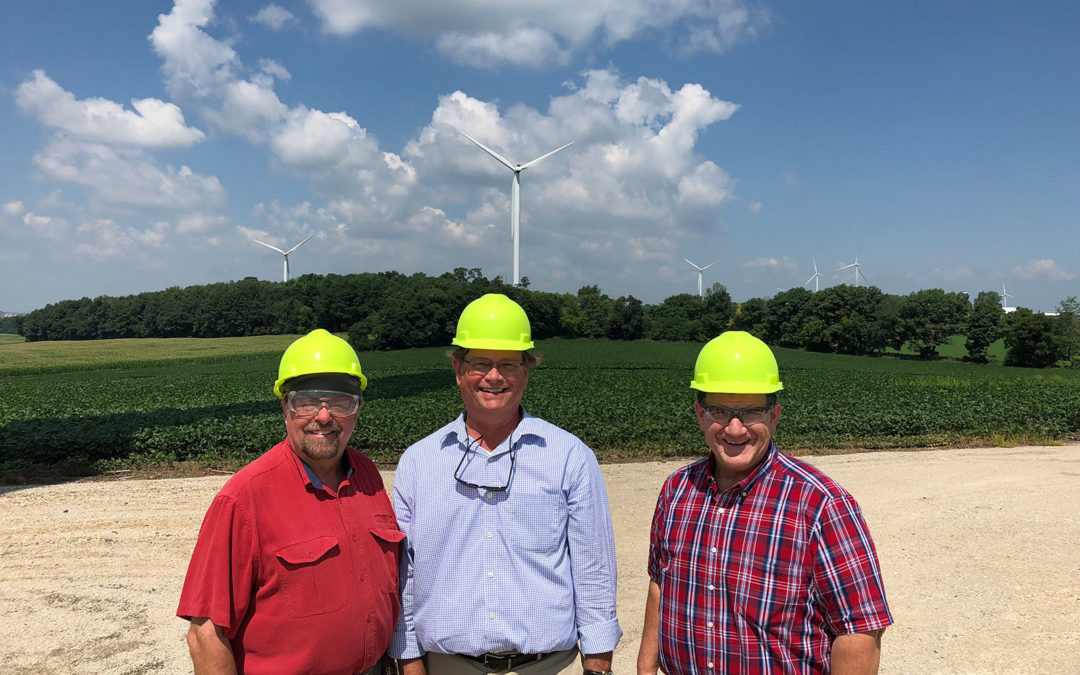
by Jim Boullion | Jul 30, 2018 | Events, Hydroelectric, RENEW Wisconsin, Renewables, Solar, Wind
Cedar Ridge Wind Farm
On July 24th Alliant Energy hosted a tour of their Cedar Ridge Wind Farm in Fond du Lac County for several state legislators to discuss not only wind, but all of the latest developments in renewable energy. Built in 2008, Cedar Ridge was one of the first wind installations in the state. Alliant Energy owns and operates this site of 41 turbines that has a capacity of generating 68 mW of electricity, enough to power 17,000 homes. In its 10 years of existence, Alliant calculates that the electric power generated by these wind turbines allowed them to avoid burning enough coal to fill a 99-mile-long coal train! Alliant currently owns 569 mW of total wind power, but because of falling costs, efficiency gains of the turbines, and inexpensive operations and management, they expect to invest in an additional 1,150 mWs of wind generation by 2021. Representatives Bob Kulp and Rick Gundrum came away impressed and posted very positive comments online about the tour and the many developments in renewable energy.
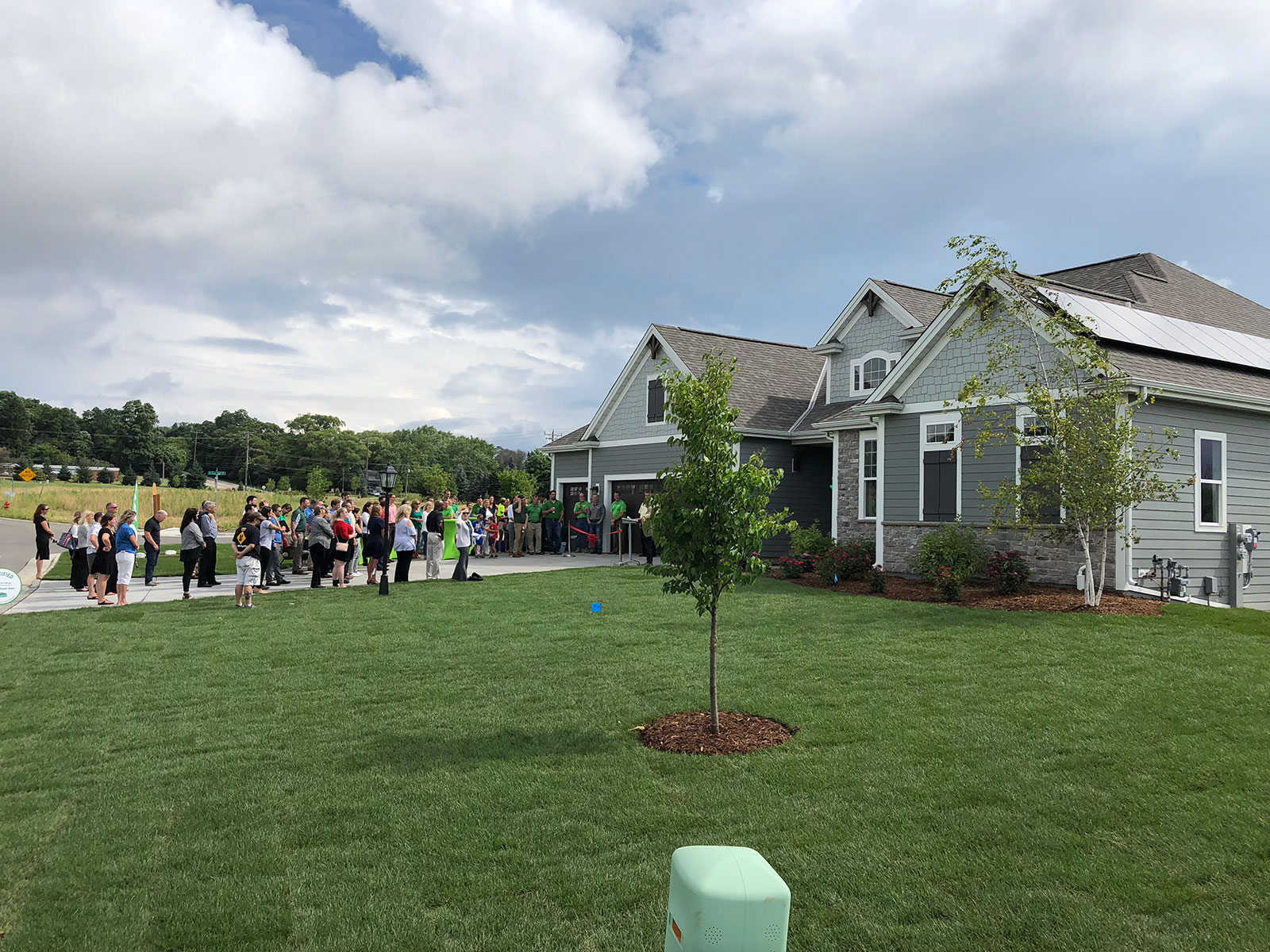
Tim O’Brian Homes Net Zero Community
On July 20th I visited a ribbon cutting for the new Tim O’Brian Homes Net Zero Community in New Berlin. This all-solar subdivision is the first of its kind in Wisconsin. In partnership with Neumann Companies and SunVest Solar, Inc., they are developing the Red Fox Crossing subdivision with a focus on sustainability and energy efficiency. Not only is every home in the subdivision designed from the ground up to include 6 to 8 kW photovoltaic solar arrays, but they are also certified ENERGY STAR® V3 National Qualified Homes. “Buyers are looking for ways to save on their true cost of homeownership,” says Angela Cooper, Milwaukee Division President of Tim O’Brien Homes. “The upfront costs of building a net zero home might be slightly more than a code-built home but the money saved in monthly utility bills results in an overall less expensive home.” The subdivision has been popular, with half of the 34 units already sold. “Red Fox Crossing has the potential to be the turning point in building a more sustainable community in Wisconsin, versus focusing on only one home at a time,” says Tim O’Brien, President of Tim O’Brien Homes. ”

Badger Hydroelectric Plant
On July 13th I joined State Senator Rob Cowles (District 2-Green Bay) and Representative Dave Murphy (District 56-Greenville) on a tour of the Badger Hydroelectric plant in Kaukauna. The visit was hosted by the Kaukauna Municipal Utility, a member of WPPI Energy. As noted in this WBAY news story, the visit was designed as a discussion about renewable energy of all kinds. Hydroelectric power was one of the first, and least expensive sources of electric power. The Kaukauna facility is 110 years old and had a major upgrade in 2013, giving it a capacity of 7 mW of power, up 40% from the capacity of its two old powerhouses. During the meeting we discussed the dropping prices for wind and solar power and the tremendous amount of renewable energy that is currently listed on the 4-year MISO planning queue. It was noted that WPPI Energy, Dairyland Power and the investor owned utilities are looking to close their coal burning power plants and invest in utility scale wind and solar projects. They are doing this because wind and solar cost less than coal and the rising customer demand for renewable energy. This competitive, market-driven demand for renewable energy has led Wisconsin to easily surpass the 10% Renewable Portfolio Standard (RPS) that was established by the state legislature in 2006, and shows no signs of slowing!

Governor Walker Helps Energy Bank Announce Renewable Energy Lighting
On July 9th I was invited by Energy Bank, Inc. to attend the unveiling of a new product called FUSION. Neal Verfuerth, owner of Energy Bank, invented this new lighting system that uses the DC power output from photovoltaic solar panels to directly energize LED fixtures – without conversion to AC. Governor Scott Walker gave the keynote speech where he said Wisconsin companies understand the need to keep their peak energy demand low and reduce the overall cost of energy to be economically viable. Walker said that businesses understand that “to be environmentally sustainable, you need to be economically sustainable”, and products like FUSION make that happen. The Governor was excited about innovative and high-tech companies like Energy Bank locating in Wisconsin, creating the new era technologies that will create jobs and attract millennial workers to Wisconsin. I had a few minutes to speak with both the Governor and Representative Paul Tittl (District 25-Manitowoc) at the end of the event about the exciting advancements and fast falling prices that renewable energy has had in the last few years. They were very interested and are looking forward to working with RENEW to help keep that momentum going.

The 29th Annual Energy Fair
On the weekend of June 15-18 I had the pleasure of visiting the MREA Energy Fair in Custer. This was my first visit to the Energy Fair and all I can say is that I was blown away! They had an amazing number of great seminars (over 250) on renewable energy, energy conservation and sustainable practices of all kinds. I was able to see, sit in and learn about many different electric vehicles (over 70 of them were on-site) and discuss with EV aficionados what the exciting future of transportation might look like. There were also over 450 exhibitors, presenters and sponsors from around the country. There were great speakers, entertainment and interesting people everywhere you looked. Everyone was up-beat and excited about renewable energy and how quickly it is taking over the energy market. Finally, the most fun part of the weekend was having me drive the RENEW Wisconsin electric demolition derby car. I won my initial heat and was in the final event. A controversial call by the umpires and a slight miscalculation on my part kept me out of the winner’s circle, but at the end of the evening everyone was a winner and we all had a great time!!

 The day started off cool, but as the sun rose the temps came along with it. Ingeteam hosted our morning breakfast and registration, and we learned about their factory and US headquarters which builds wind generators and supports solar and wind projects nationwide.
The day started off cool, but as the sun rose the temps came along with it. Ingeteam hosted our morning breakfast and registration, and we learned about their factory and US headquarters which builds wind generators and supports solar and wind projects nationwide. Next we visited the City of Milwaukee’s Public Library, where the City’s Elizabeth Hittman regaled our crowd with the City’s plans to install 1.1 megawatt of solar across six City buildings. The Library will get a 121 kilowatt solar PV system as part of this project.
Next we visited the City of Milwaukee’s Public Library, where the City’s Elizabeth Hittman regaled our crowd with the City’s plans to install 1.1 megawatt of solar across six City buildings. The Library will get a 121 kilowatt solar PV system as part of this project. A block away, we visited the largest vertical solar PV wall in the U.S. according to project developer Convergence Energy. The project is at the Milwaukee Public Museum, and Director Ellen Censky motivated our crowd with her story of getting sustainability done!
A block away, we visited the largest vertical solar PV wall in the U.S. according to project developer Convergence Energy. The project is at the Milwaukee Public Museum, and Director Ellen Censky motivated our crowd with her story of getting sustainability done! Next, we rode trails north to Shorewood where we saw solar on homes from a recent solar group buy through the City’s Milwaukee Shines Programand the Midwest Renewable Energy Association.
Next, we rode trails north to Shorewood where we saw solar on homes from a recent solar group buy through the City’s Milwaukee Shines Programand the Midwest Renewable Energy Association. Then we headed to the lake, where we ate lunch at the Discovery World which includes geothermal heating and cooling, which ride sponsor HGA Architects helped integrate into the building.
Then we headed to the lake, where we ate lunch at the Discovery World which includes geothermal heating and cooling, which ride sponsor HGA Architects helped integrate into the building. Have you ever had solar-powered pizza delivered by an electric car? We did! Our lunch was delicious and provided by Bounce Milwaukee. Bounce uses solar electricity to power solar ovens that cook pizzas, which are then delivered by electric cars. Ice cream was also provided by Cedar Crest Ice Cream.
Have you ever had solar-powered pizza delivered by an electric car? We did! Our lunch was delicious and provided by Bounce Milwaukee. Bounce uses solar electricity to power solar ovens that cook pizzas, which are then delivered by electric cars. Ice cream was also provided by Cedar Crest Ice Cream. After lunch, we visited the Port of Milwaukee’s wind turbine which is close to producing 1 million kilowatt-hours of electricity and is coming up on six years of operation.
After lunch, we visited the Port of Milwaukee’s wind turbine which is close to producing 1 million kilowatt-hours of electricity and is coming up on six years of operation. Then, two non-profit organizations showed how broadly solar has grown. Mike Cornell of Arch Electric showed off their project at the School Sisters of St. Francis, which we believe is the largest solar project for a religious order in Wisconsin. The solar panels at this project are made in Jackson, Mississippi, by Seraphim.
Then, two non-profit organizations showed how broadly solar has grown. Mike Cornell of Arch Electric showed off their project at the School Sisters of St. Francis, which we believe is the largest solar project for a religious order in Wisconsin. The solar panels at this project are made in Jackson, Mississippi, by Seraphim. Escuela Verde was our second-to-last stop, where Catie Malcheski of Sunvest described the school’s vision and actions to get solar. The panels had been donated by Helios when it was making panels in Milwaukee a few years ago, but the school needed to raise the money to complete the installation. RENEW’s Solar for Good program was a key contributor to making the project happen!
Escuela Verde was our second-to-last stop, where Catie Malcheski of Sunvest described the school’s vision and actions to get solar. The panels had been donated by Helios when it was making panels in Milwaukee a few years ago, but the school needed to raise the money to complete the installation. RENEW’s Solar for Good program was a key contributor to making the project happen! Our last stop was at the Forest County Potawatomi Community’s Biodigester, which is located next to the casino. The Biodigester takes food waste from the casino and other locations and turns it into biogas, which is then used to create electricity. Waste heat is also piped to the casino in the winter. Charlie Opferman of the Potawatomi Community told us how the biodigester is basically a big stomach in action.
Our last stop was at the Forest County Potawatomi Community’s Biodigester, which is located next to the casino. The Biodigester takes food waste from the casino and other locations and turns it into biogas, which is then used to create electricity. Waste heat is also piped to the casino in the winter. Charlie Opferman of the Potawatomi Community told us how the biodigester is basically a big stomach in action. We finished up by having a beer and snacks at City Lights Brewing Company.
We finished up by having a beer and snacks at City Lights Brewing Company.

